Introduction
This presentation will discuss the following questions:
- The history of organizational behavior (OB) as a field of study.
- The main characteristics of this science.
- The main principles identified in OB studies and their value.
- The practical role of this field for the functioning of businesses. In particular, one should focus on such an organization as Google.
Overall, it is first necessary to provide a definition of organizational behavior as a field of study. Moreover, one should explain how this science evolved during the twentieth century. Furthermore, much attention should be paid the way in which theoretical concepts of organizational behavior are translated into real-life policies of Google. To a great extent, this example is important because it throws light on some of the best practices in organizational management. Moreover, this discussion can be used for the development of recommendations that business administrators should consider.
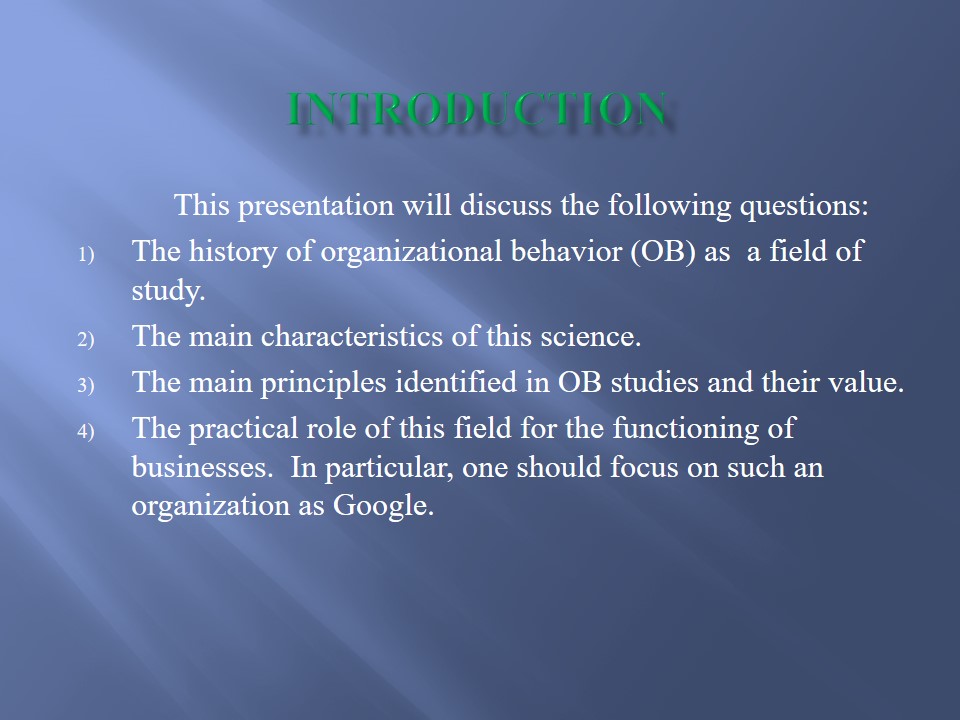
Definition of organizational behavior
Organizational behavior can be defined the examination of people’s “behaviors , attitudes, and performances” within an organization (Vasu., Stewart, & Garson, 1998, p. 3). It should be noted that managerial scientists examine the functioning of institutions at the following levels:
- Micro-level (the behavior of a separate employees);
- Meso-level (the attributes of workgroups in institutions);
- Macro-level (the general attributes of an organization).
This definition is aimed at identifying the main elements that organizational studies are supposed to examine. Moreover, this interpretation highlights the main attributes of an organization. In particular, it can be viewed as a hierarchical system composed of separate individuals, small workgroups, divisions, and so forth. Furthermore, the functioning of the entire system is strongly dependent on the behavior of the elements, occupying low position in the hierarchy. These are main points that can be made.
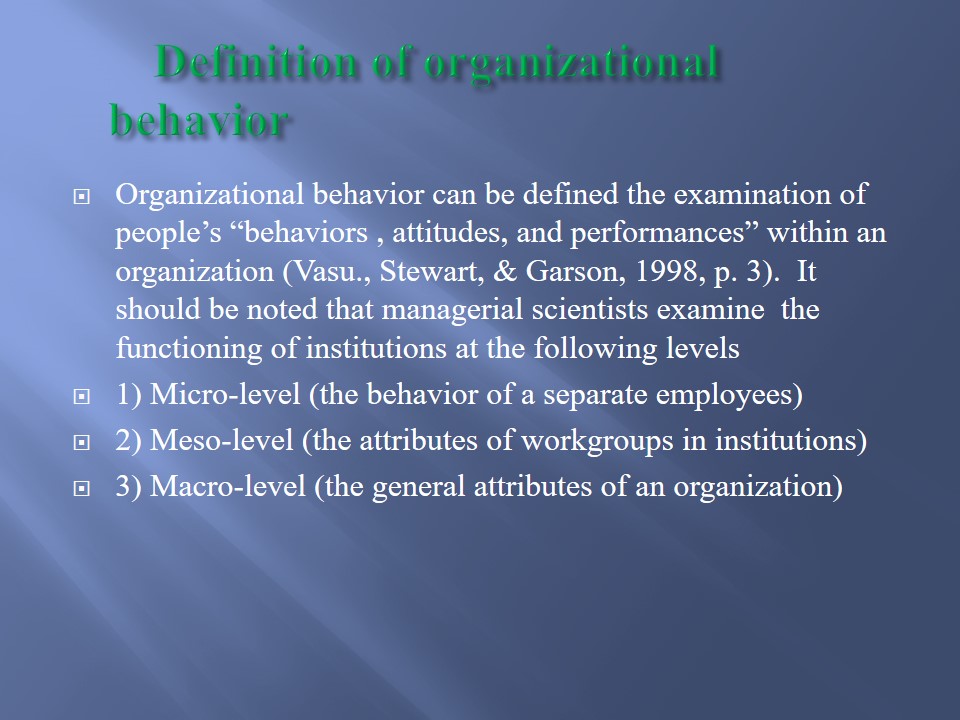
Characteristics of Organizational Behavior as a Field
Multi-disciplinary nature of this science
- Organizational Behavior:
- Psychology;
- Sociology;
- Natural sciences;
- Mathematics;
- Economics;
This chart is aimed at illustrating the main attribute of organizational behavior as a field. In particular, this field of study derives knowledge from various sciences. This approach has significantly contributed to the development of this discipline. For instance, one can argue that the concepts of natural sciences led to the introduction of systems theory which is an important element of this discipline (Vibert, 2004, p. 110). These are the main points that can be made.
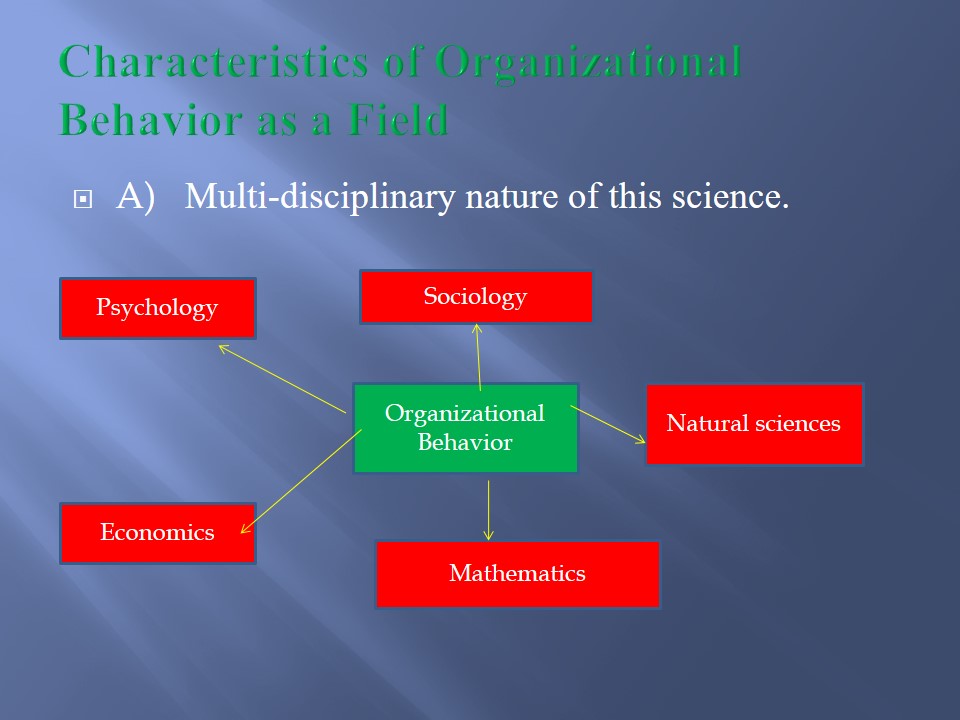
Diversity of topics examined in organizational studies
The multi-disciplinary nature of this field can be explained by the diversity of topics examined in organizational studies. For instance, one can mention the following issues:
- Attitudes, beliefs , and motives of employees;
- The interactions between organizational units;
- The ways of improving productivity;
- Culture as a set of shared beliefs and attitudes;
- Organizational responses to the changes in the outside world.
This list included in this slide is by no means complete; nevertheless, it demonstrates that the study of organizational behavior should be based on the information provided by different sciences. Moreover, a person should understand the complexity of organizational behavior which can be affected by various factors originating from both internal and external environment. Thus, business administrators should focus on these issues to make sure that the functioning of a business is not impaired significantly.
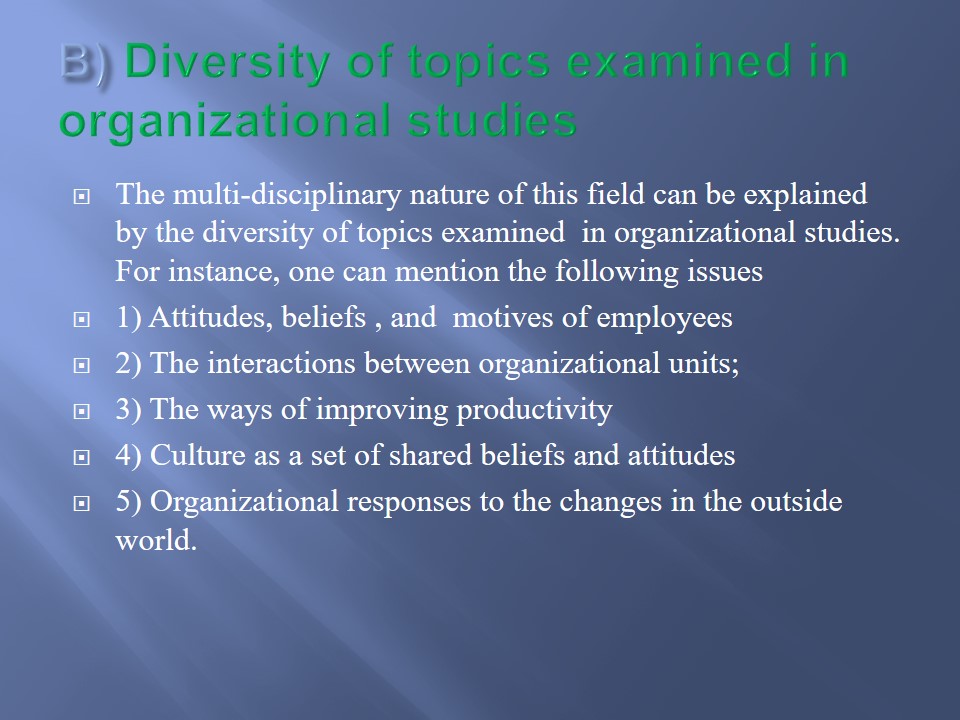
History of this Field
Timeline
- The beginning of the twentieth century:
- At that period, various business administrators such as Frederick Taylor focused on the ways of increasing productivity.
- The beginning of the twentieth century:
- At that period, various business administrators such as Frederick Taylor focused on the ways of increasing productivity.
- 1960-1980:
- Quantitative studies that focused on the way in which differrent components of an organization interact with one another. For instance, one can mention such issues as rational decision-making, the flow of information, the use of resources, and so forth.
- 1980- Current Days:
- Currently, researchers strive to focus on the influence of cultural factors on the behavior of organizations.
This timeline illustrates the way in which the study of organizational behavior has evolved during the twentieth century. It is possible to say that during this period, the discipline shifted from the study of productivity to the examination of cultural peculiarities (Borkowski, 2009, p. 5). It should be mentioned that some aspects are now mostly studied in other disciplines. For instance, one can speak about the study of supply chain or production methods (Borkowski, 2009, p. 5).
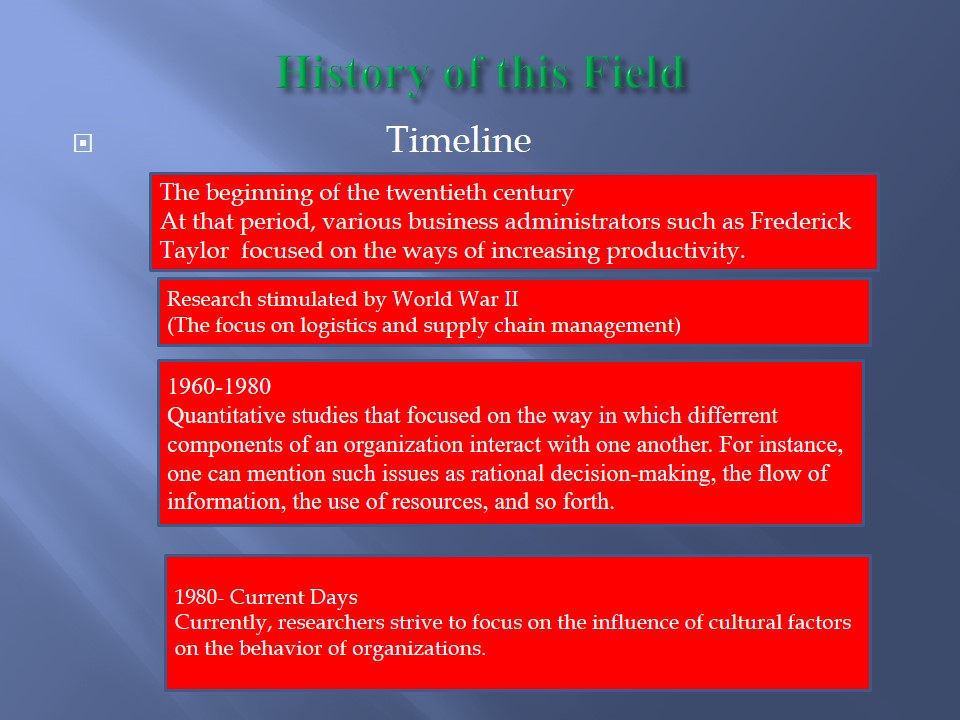
The Main Concepts and Principles
It is possible to identify several concepts that play a critical role in this field.
- Organizational responsiveness or the ability of a business to adjust to new social or market trends.
- Empowerment of employees which can be defined as the delegation of authority to the workers who should be able to take initiatives.
- Willingness to experiment with new ideas or methods.
- Workplace environment that increases the satisfaction of employees.
This slide is aimed at identifying the main characteristics of effective organizations. It should be mentioned that such studies are supposed to single out those attributes that enabled various companies to remain sustainable even despite external difficulties (Denilson, Hooiberg, & Lane, 2012, p. 7). Overall, researchers, who work in this area, attempt to develop practical guidelines that should affect the decisions of business administrators. Furthermore, these issues are important for organizational design and development of rules that should be followed by various stakeholders.
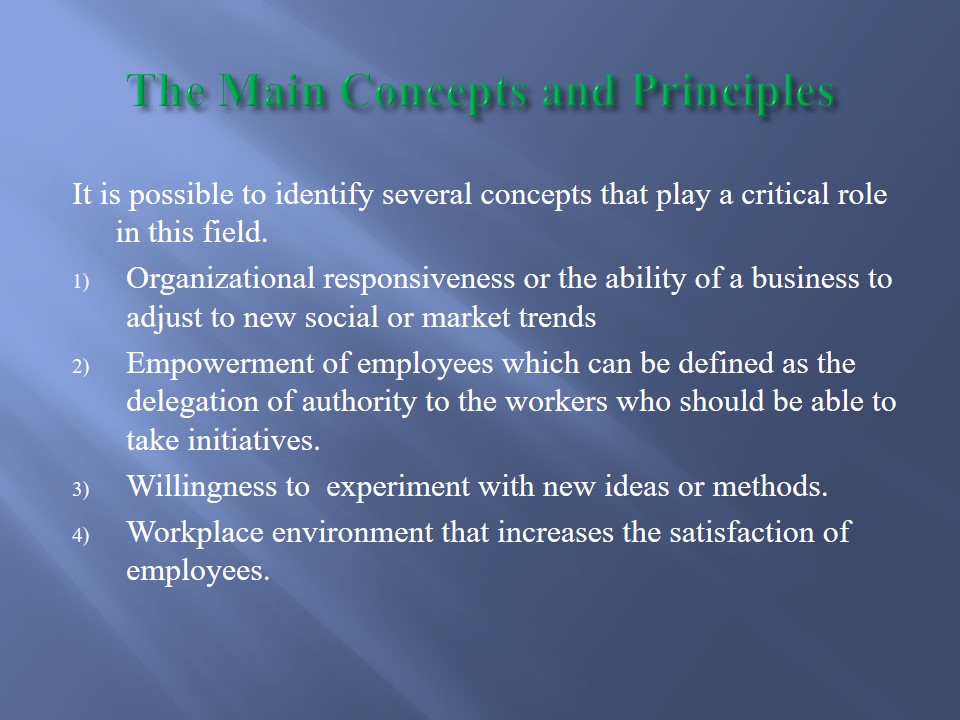
The Value of Organizational Behavior as a Field of Study
Organizational has the following implications:
- It enables business administrators to strengthen the employees’ commitment to organizational goals.
- Theoretical and empirical research is important for understanding how the organization can be made more resistant to external stressors.
- This discipline can provide practical guidelines for improving the operations of a business.
- This science can assist business administrators in identifying potential problems at early stages.
Overall, the study of organizational behavior can offer a variety of tools that managers can apply on a regular basis. These professionals will be able to understand how the organization acts as a whole. Moreover, they will identify a set of best practices which contribute to the effectiveness of an enterprise. Moreover, this field of study can help them identify the main pitfalls that should be avoided. These are the main benefits that this field of managerial science can offer.
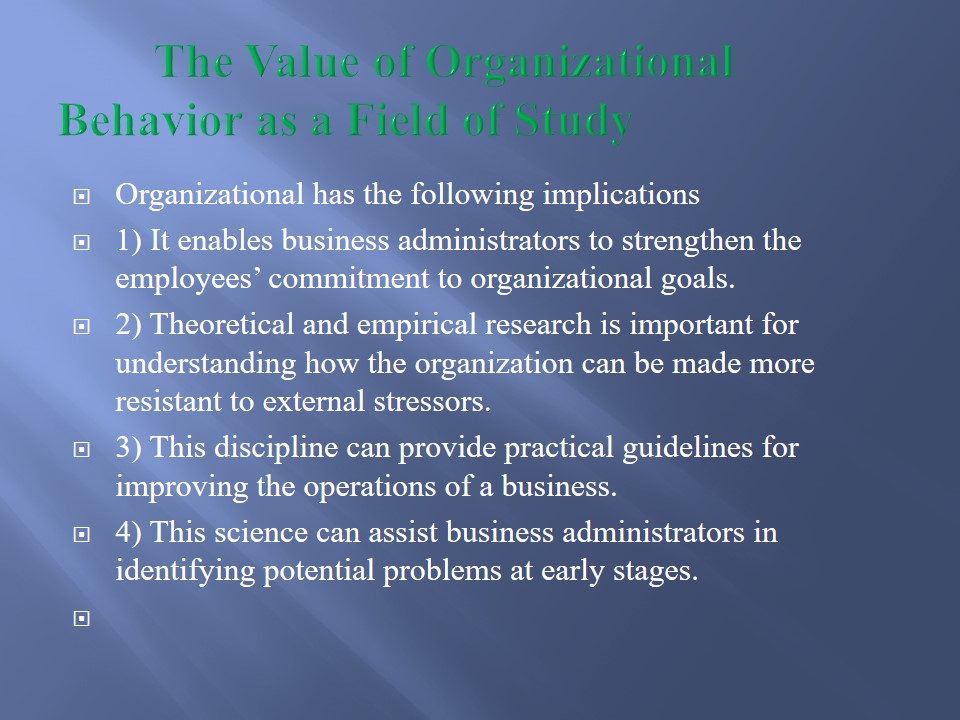
Organizational Behavior and Google
It is possible to argue that the study of organizational behavior has significant implications for many businesses. For instance, one can mention Google. This corporation has the following characteristics:
- Increased autonomy of employees who can spend a portion of their time on the projects that they are most interested in.
- Openness of the senior management.
- Absence of bureaucratic barriers between different departments of the organization.
Overall, these examples indicate that the principles identified during theoretical studies can have significant implications for the practices of the modern companies. The corporate behavior of Google is partly based on the premise that even the smallest component of a system can have significant implications for the performance of the entire organization (Schutz, 2012, p. 4). These are the reasons why they pay much attention to the empowerment of workers. To some degree, this strategy is critical for the financial performance of this corporation.
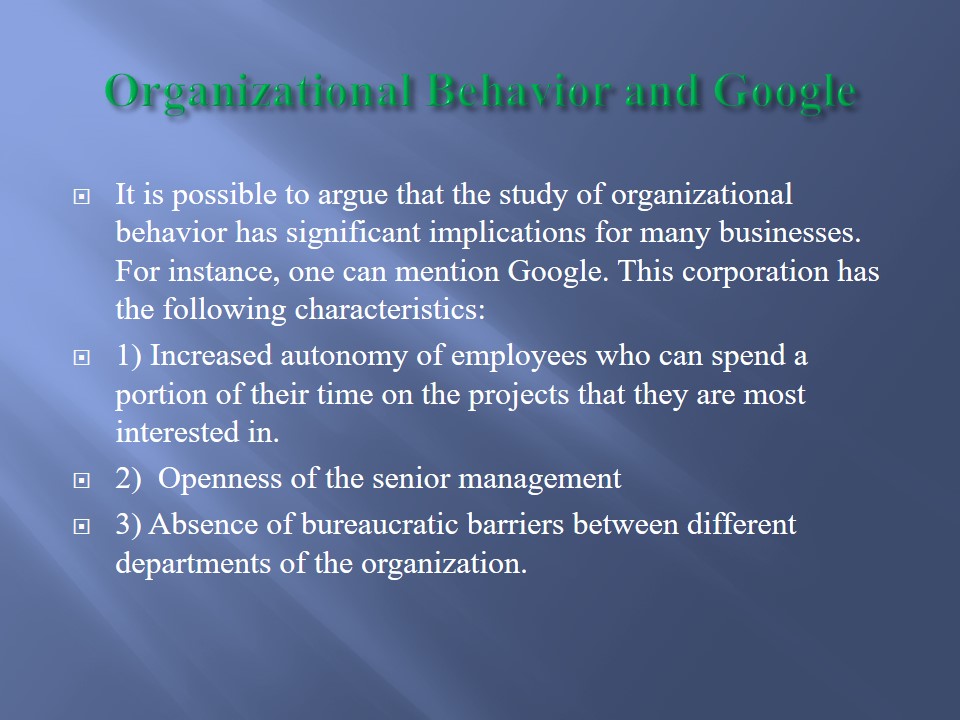
The Importance of Organizational Behavior for Financial Performance
It should be noted that the application of theoretical principles has significant implications for the financial performance of Google. To illustrate this issue, one can look at the following chart that throws light on the profitability of this organization during the last decade (Johnson, 2012).
This chart indicates that during the last decade, Google has been able to improve its performance. Admittedly, it is possible to say that these financial results can be attributed mostly to the technological edge of this company. Nevertheless, the leading representatives of this organization emphasize the idea that continuous competitiveness of Google is possible only if the organization acts as a start-up company (Schutz, 2012, p. 4). Therefore. the organizational culture is critical for the competitiveness of this corporation.
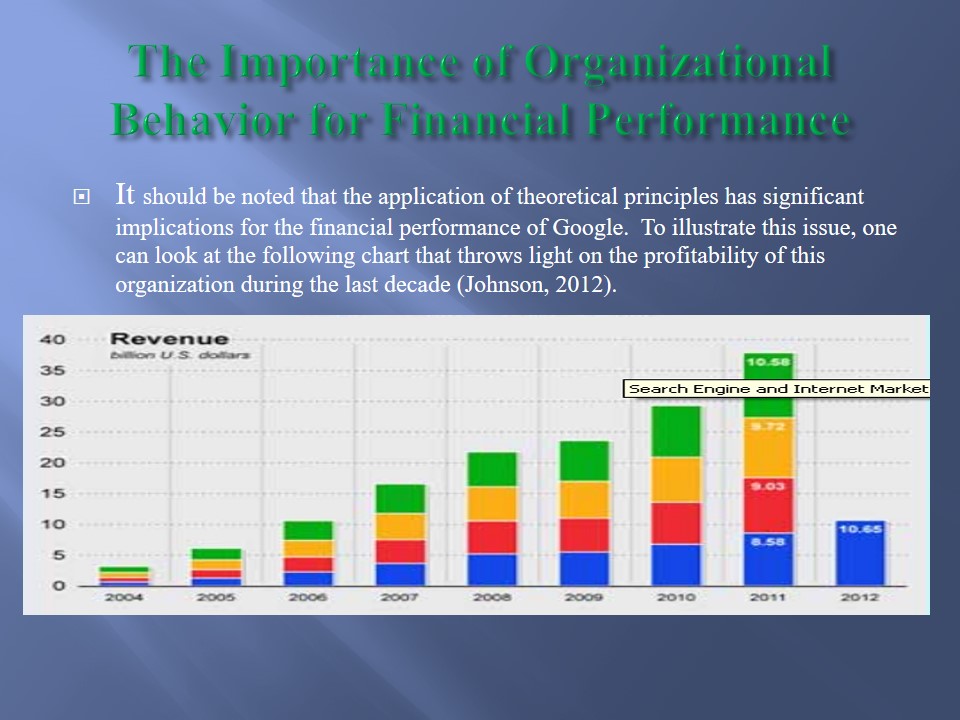
Recommendations
There are several suggestions that business administrations should consider.
- It is important to identify those factors that make people committed on their work.
- Managers should also find ways of delegating some of their authorities to the frontline personnel.
- One should remove the bureaucratic barriers that hinder the communication between employees and managers.
- The employees should be encouraged to express their views about the current business practices. Moreover, their initiatives should be supported.
These recommendations are based on various theoretical elements that are critical for the study of organizational behavior. For instance, one can speak about such concepts as motivation, empowerment of workers, and acceptance of innovation. These suggestions reflect the theoretical arguments according to which the general attributes of an organization are formed by various stakeholders Moreover, the policies cannot be imposed only be senior managers. This is why one should focus on the role played by workers. These are the main points that can be considered.

Conclusion
The examples provided in this presentation suggest that:
- The study of organizational behavior can be translated into the real-life policies of companies. In particular, the suggestions of scholars are taken into account by the most effective companies.
- This area of study requires the methods of different sciences because only in this way, one can reflect the complexity of organization.
- Much attention is currently paid to the culture of organizations. In particular, one can speak about the values and assumptions of employees as well as managers.
Admittedly, this presentation cannot throw light on every trend that currently affects of the study of organizational behavior. Nevertheless, the main issue is that modern researchers focus on those aspects that increase the resilience of an organization. Moreover, business administrators accept the importance of these theoretical discussions. Furthermore, this policy contributes to the effectiveness as well financial performance of many businesses. Google is only one of the companies acting in this way. These are the main arguments that can be advanced.
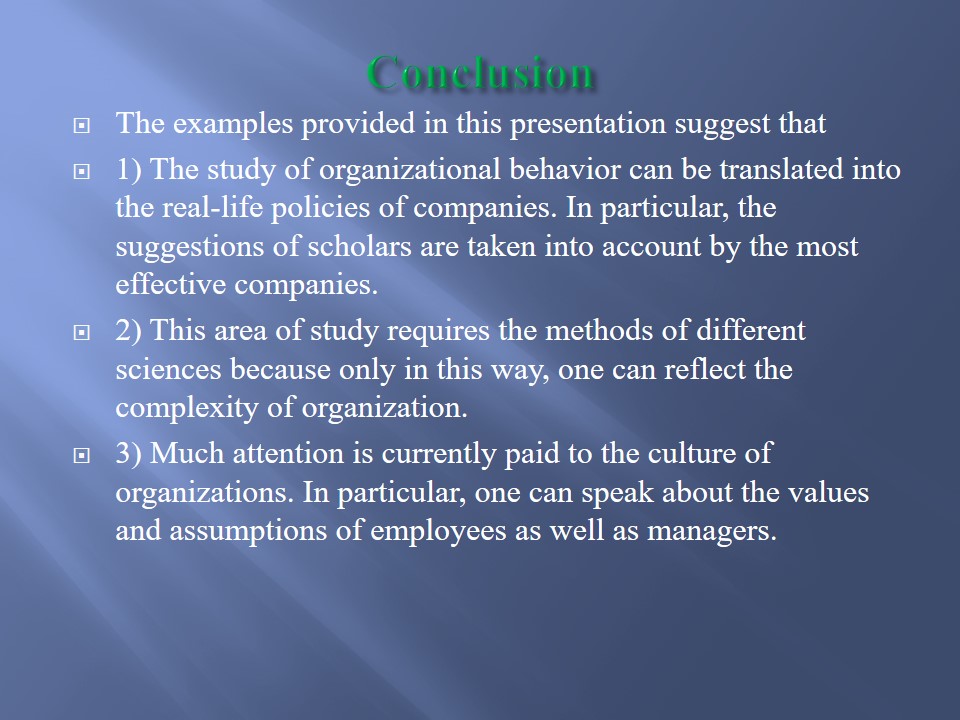
Reference List
Borkowski, N. (2009). Organizational Behavior, Theory,. and Design in Health Care. New York, NY: Jones & Bartlett Learning.
Denilson, D., Hooiberg, R., & Lane, N. (2012). Leading Culture Change in Global Organizations: Aligning Culture and Strategy. New York, NY: John Wiley & Sons.
Johnson, P. (2012). Inbound Marketing Weekly Roundup for Week Ending. Web.
Schutz, K. (2012), How Extraordinary Job Satisfaction can be achieved: Examples from best practises. New York, NY: Grin Verlag.
Vasu, M., Stewart, G., & Garson, D. (1998). Organizational Behavior and Public Management, Third Edition, Revised and Expanded. New York, NY: CRC Press.
Vibert, C. (2004). Theories of Macro Organizational Behavior: A Handbook of Ideas and Explanations. New York, NY: M.E. Sharpe.